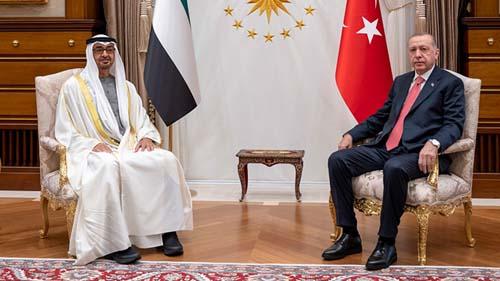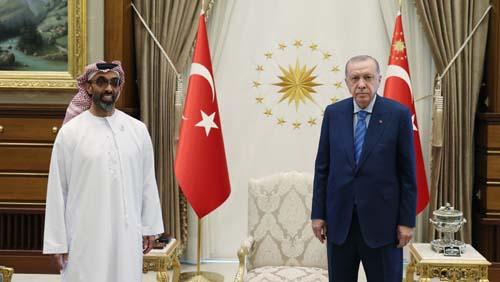
Turkey and the Gulf grow closer
Sinem Cengiz
In international relations there is a well-known argument connecting defense and security needs with economic interests. Historically, under certain circumstances, states deepen their relations through both trade and defense diplomacy. In most cases, economic and defense trade makes a positive relationship more likely. Given the latest developments in Turkey-Gulf relations as part of the reconciliation process, the question is what comes next.
Several attention-grabbing developments have taken place in Turkey’s relations with the Gulf states in the past few weeks. First, Turkey’s Energy and Natural Resources Minister Fatih Donmez said that Ankara was holding talks with Oman on natural gas trade.
The minister has visited several countries amid the sharp increase in global energy prices. Last month he had what he described as fruitful meetings in Oman and Qatar that focused on investment opportunities in the oil and gas sector, renewable energy, and related industries. On natural gas trade with Oman, he said: “We will act when commercial conditions are appropriate.” In June, Turkey’s annual natural gas imports fellby 5.64 percent to 3.84 billion cubic meters

Turkey has not had natural gas trade with Oman, so Ankara’s move was significant both diplomatically and economically. When compared to Turkey’s relations with other Gulf countries, those with Oman are still at a moderate level. They have been mostly neutral, with no serious ups and downs, and motivated by pragmatism. For Muscat, diversifying its partnerships with regional actors, especially in the fields of defense and trade, has become a vital option. Over the past few years, Turkey’s defense industry has increased its sales to Gulf countries and this may be an area of cooperation with Turkey that Muscat could deepen in the future. We have yet to see whether there will be any defense cooperation, but Turkish-Omani relations are gaining impetus in other areas such as tourism and trade. Oman Air increased flights to Istanbul and Trabzon last week because of extraordinary demand.
The UAE’s desire to become involved in strategically significant sectors of the Turkish economy, such as drone production, is an indication of a “trading for security” understanding in Turkish-Emirati relations.
The second development was a report of UAE negotiations with Ankara to purchase TB2 armed drones from the Turkish manufacturer Baykar, which may add another customer to the growing list of countries interested in acquiring the weapons. Emirati and Turkish defense companies have already cooperated on the Rabdan amphibious armored vehicle.
These new Turkish-Emirati ties are quickly proving lucrative. The two states are also about to finalize a free trade deal. The UAE’s desire to become involved in strategically significant sectors of the Turkish economy, such as drone production, is an indication of a “trading for security” understanding in Turkish-Emirati relations.
The third development was the Qatar Investment Authority’s purchase of a large stake in Istanbul’s Avrasya — or Eurasia — Tunnel across the Bosphorus strait in Istanbul. By December last year, Qatar’s investments in Turkey reached $22 billion, and 533 Turkish companies operate in Qatar in projects worth at least $18.5 billion. In turn, 179 Qatari companies operate in Turkey. Meanwhile, the diplomatic traffic between Turkish and Gulf diplomats has intensified in the past few months. Turkish ambassadors in Gulf capitals, in particular Riyadh and Abu Dhabi, have been holding frequent meetings to foster the new era in Turkey-Gulf relations.
Turkey’s expansion of multifaceted engagement with the Gulf states, after normalization thanks to the reconciliation climate, is reflected in areas that were not explored previously, so the goals of both from the normalization may be coming to fruition. As I have argued before, relations based on institutions and fostered through diverse fields, and for the long term rather than short-term political or economic gain, will be beneficial for both Turkey and the Gulf states in this increasingly volatile region.
The writer is a Turkish political analyst who specializes in Turkey’s relations with the Middle East
